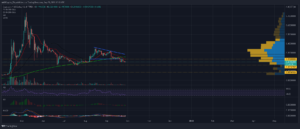
Trends and innovations in supply chain and logistics. That is what this blog is all bout. Therefore I bring you an overview of the news this week on logistics start-ups and innovations below. Follow @LogisticsMatter on Twitter to stay up to date with the latest news and the best background stories. The previous edition was Drones, Google Your Digital Twin, and Sustainability. This edition is about Self-driving trucks and other transport innovations, drone deliveries, and robots in warehouses and retail stores. There were also three articles I came across that I couldn’t fit in any of this week’s categories:
Automation (~ King Gizzard & The Lizard Wizard)
Plus, a developer of driverless software is working hard to enable trucks to drive without drivers. Whether you look to the United States, the UK, or the European mainland, there is a shortage of truck drivers everywhere. Many transportation companies would love to be able to operate trucks without drivers. After a successful road test on public roads in China in June, Plus has partnered with Chines truck builder First Auto Works (FAW). FAW is producing a Level 4 Autonomous Truck. The Level 4 trucks will operate on Chinese roads under driver supervision, known as Level 2 autonomy.
In a Level 4 Autonomous Truck, the driving system monitors the driving environment. The driver’s attention is not needed to operate the vehicle safely. Level 4 vehicles operate in designated areas. Outside these areas, the driver is responsible for the safe operation of the vehicle. A Level 5 Autonomous Truck is completely driverless under any circumstance. For more information on the different levels of automation, check out the Self-driving car Wikipedia page.
Another company working on self-driving trucks is Locomation, which wrote an open letter informing truck drivers why self-driving trucks will be good for them. They are developing technology to creating semi-self-driving convoys. The lead truck will be operated by a driver, while the truck right behind it will be driven by the Locomation system, while the driver of that truck sleeps. This will enable driver teams to operate two trucks for 20-22 hours per day.
After Hyundai announced their hydrogen fuel plans for the future, including the Truck of the Future, Honda couldn’t stay behind. They have announced that they will spend more than $45 billion on research and development. They will work on rockets, robots, and electric vertical takeoff and landing aircraft (eVTOL). For range, they will not equip this eVTOL with fully electric propulsion systems but rely on hybrid solutions adding gas turbines. For now, the eVTOL vehicles are aimed at transporting people.
Toyota is also working on self-driving vehicles. It has bought Renovo Motors, which is a start-up that makes operating systems for autonomous vehicles. The Verge writes:
Toyota established Woven Planet in January 2021 to invest in and develop mobility with artificial intelligence. Since then, the company has been on a shopping spree, acquiring Carmera, a firm that provides real-time, high-definition maps and data for driverless vehicles, and Lyft’s Level 5 autonomous vehicle division.
Drones (~ Novaa)
Drones. A topic we touch upon often on the LogisticsMatter blog. There is a lot to write about this topic because there are many different companies, start-ups, and large parcel carriers working on enabling drone delivery. I came across an excellent article on Freightwaves this week about two great examples: Flytrex and Matternet.
Flytrex pivoted its focus to B2C deliveries. Today, its drones operate out of stations located in two Fayetteville, North Carolina-area shopping centres. The autonomous drones deliver from the centres’ stores — including Walmart — to customers in surrounding suburbs who can order via Flytrex’s phone app.
And:
Matternet’s drones are one piece in the company’s end-to-end delivery offering, said Jon Michaeli, the company’s global head of sales and business development.
There’s also Matternet’s stations, in which payloads are deposited and inserted into the drones. Finally, there’s the company’s software platform that generates routes and controls all Matternet assets.
Also, check out Drone Disruptors: Matternet is taking cities into the skies. Some excellent videos there about the approach Matternet is taking.
The Robots (~ Kraftwerk)
According to a recent press release, research by Gartner has found that there will be a growing interest from retailers and warehousing companies alike in smart robots. These robots can be used to both support and replace retail and warehouse workers. Some of the findings:
* “Over the next year we expect pilots and implementations of smart robots in physical stores and warehouse environments to persist. As a result, they will continue to garner significant attention and interest from both retailers and consumers alike.”
* “Smart robots can be added incrementally and deliver significant value, without large-scale deployment or disruption. A single robot can deliver a significant return on investment; therefore, investments can be incremental over several years.”
* “Smart robots enable real-time data capture and analysis essential for unified commerce execution. However, the data must also be connected to store and back-office systems to realize full potential.”
An excellent example of a retailer testing robots in stores is Hy-Vee. Hy-vee is using robots to keep track of items on shelves. The robots move through the isles and take stock of what’s on the shelves with high definition cameras. Simbe Robotics produces the robots. The robots are tested in five different stores.
Header Image by Rock’n Roll Monkey on Unsplash
Source: https://logisticsmatter.com/innovations-and-start-ups-self-driving-trucks-drones-and-robots/
- "
- &
- 2021
- 9
- aircraft
- All
- analysis
- announced
- app
- articles
- artificial intelligence
- Assets
- audio
- auto
- Automation
- autonomous
- autonomous truck
- autonomous vehicle
- autonomous vehicles
- BEST
- Billion
- Blog
- builder
- business
- cameras
- car
- chinese
- Cities
- Commerce
- Companies
- company
- Consumers
- content
- continue
- Creating
- Customers
- data
- day
- Deliveries
- delivery
- develop
- Developer
- Development
- digital
- digital twin
- Disruption
- Disruptors
- driven
- driver
- driverless vehicles
- driving
- drone
- Drones
- Electric
- Environment
- European
- execution
- Finally
- Firm
- First
- fit
- Focus
- follow
- Fuel
- full
- future
- Gartner
- GAS
- Global
- good
- great
- Growing
- head
- High
- HTTPS
- Hybrid
- hydrogen
- Hyundai
- image
- Including
- information
- Intelligence
- interest
- investment
- Investments
- IT
- King
- large
- latest
- Latest News
- lead
- Level
- level 4
- logistics
- love
- Maps
- mobility
- move
- Music
- news
- North
- offering
- official
- operating
- operating systems
- order
- Other
- People
- physical
- Pilots
- planet
- platform
- press
- public
- range
- real-time
- research
- research and development
- retail
- retailers
- roads
- robot
- robotics
- robots
- Roll
- safe
- sales
- self-driving
- self-driving vehicles
- Shopping
- smart
- Software
- software platform
- Solutions
- spend
- Start-up
- States
- stay
- stock
- store
- stores
- Stories
- successful
- supply
- supply chain
- support
- system
- Systems
- Technology
- test
- Testing
- The Future
- touch
- track
- transport
- transportation
- transporting
- Trends
- truck
- Trucks
- Uk
- United
- United States
- value
- vehicle
- Vehicles
- Video
- Videos
- Walmart
- Warehouse
- Warehousing
- week
- WHO
- Wikipedia
- Work
- workers
- works
- year
- years
- youtube




